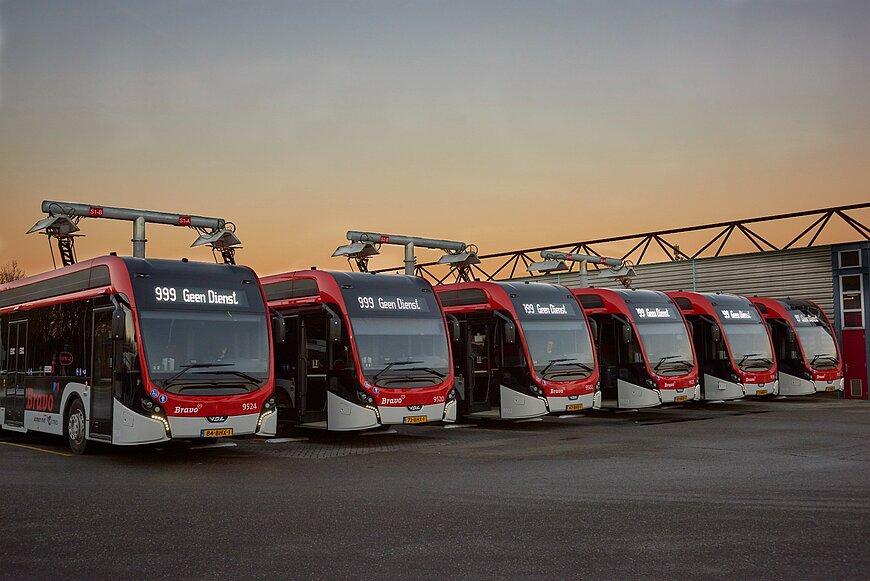Batteries from VDL Bus & Coach get a second life at RWE in 'project Anubis'

Intensively used batteries, taken from VDL Bus & Coach electric buses, get a second life in ‘project Anubis’. This initiative of energy company RWE and VDL Bus & Coach revolves around the sustainable and circular use of raw materials, in this case bus batteries, in a central storage system in Moerdijk.
The transport sector will change rapidly from highly fossil fuel-dependent to electric in the coming years. Assuming that all buses and increasing numbers of cars and lorries in the Netherlands will run on electricity after 2030, more than 150,000 tonnes of batteries will become available for recycling every year. These are currently classified as waste and mostly taken to recycling plants abroad.
Sustainability strategy
“In project Anubis, we are initially using batteries taken from 43 electric VDL buses operated by Transdev in Eindhoven since 2016,” explains Paul van Vuuren, CEO of VDL Bus & Coach. “These vehicles are currently getting new and larger battery packs, but the used batteries still have enough capacity to be used in stationary applications. In Europe, we are one of the forerunners in the field of electric public transport. Providing a sustainable circular solution for our batteries is part of our strategy. However, its application still requires a lot of new knowledge and development. Together with RWE, we will therefore collect a lot of data in ‘project Anubis’ so that we can contribute even more to making our society even more sustainable.”
Bart Kraayvanger, Manager ZE and Facility Support Transdev Netherlands:
“In 2016, together with VDL, we took the first big steps towards zero emission bus transport in the Netherlands in Eindhoven. A major feat of pioneering, from which we have learned many important lessons. Now we are once again involved in these progressive and large-scale developments in the reuse of bus batteries.”
The 43 batteries from the VDL electric buses, with a total storage capacity of 7.5 megawatts, will be coupled into one battery at the RWE power plant in Moerdijk. RWE is also working on battery projects in Germany, United Kingdom and the United States. RWE’s ambition is to grow capacity to 3 gigawatts in the coming years.
Successful energy transition
RWE is at the forefront of developing projects that contribute to a successful energy transition. Besides balancing the supply and demand of (renewable) energy, battery systems are also ideally suited for stabilising the energy network, due to their fast response time. “These are important conditions for making our energy supply more sustainable,” says Roger Miesen, CEO of RWE Generation. “With project Anubis, RWE and VDL are demonstrating that technical challenges related to the construction and operation of plants like this can be overcome. And with this project, we are actively contributing to a reduction in CO2 because after an initial phase in the VDL buses, the batteries will have an extended life at RWE. After that, they will undergo high-quality recycling.”
The aim of project Anubis is to demonstrate and validate an innovative stationary energy storage system based on bus batteries. This will enable the large-scale rollout of such projects, thus contributing to the circular economy in the Netherlands. In the coming years, many batteries are expected to return from electric vehicles. Van Vuuren: “In Europe, more than 1,100 VDL electric buses operate in various cities and regions. We therefore expect to learn a lot with project Anubis so that we can start making an important contribution to a future where second-hand bus batteries are used as energy storage systems before being recycled.”
RWE
RWE is leading the way to a green energy world. With a comprehensive investment and growth strategy, RWE is expanding its powerful green generation capacity to 50 gigawatts internationally by 2030. It is investing 50 billion euros gross for this purpose this decade. The portfolio is based on onshore wind, offshore wind, solar, hydrogen, battery storage, biomass and gas. RWE Supply & Trading provides tailor-made energy solutions for large customers. RWE has operations in the attractive markets of Europe, North America and the Asia-Pacific region. RWE is responsibly phasing out nuclear and coal. RWE employs some 19,000 people worldwide and has a clear goal: to become climate neutral by 2040. Along the way, RWE has set ambitious targets for all activities that cause greenhouse gas emissions. The Science Based Targets initiative confirms that these emission reduction targets are in line with the Paris Agreement. Entirely in the spirit of RWE’s goal: ‘Our energy for a sustainable life’.